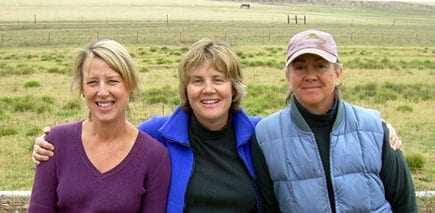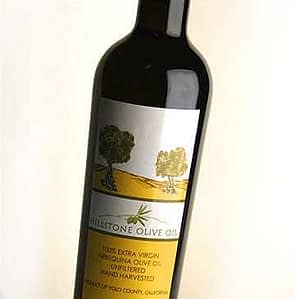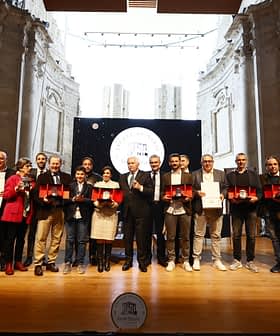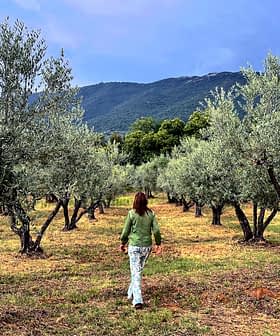By Lori Zanteson
Olive Oil Times Contributor | Reporting from Los Angeles

Voices from the past have a way of fading with the passing years. But keep listening, as Laurie Schuler-Flynn and Amy DelBondio of Hillstone Olive Oil know, and they just may lead to something. The stories told by their Italian grandmothers planted in Laurie and Amy the prolific seed to make olive oil. The stories remained tucked away in their memories until eight years ago when the idea finally sprouted and took root, continuing a tradition that reaches back more than a hundred years.
The attraction to make olive oil is easy to see for Laurie and Amy who both love to cook and eat great food. But it really began with those early family stories. Laurie fondly recalls her grandmother telling about her father and cousin making olive oil from a stone mill they had and saying, “sweetheart there is nothing better in life than tasting the fresh olive oil as it comes out and letting it drip on a piece of fresh bread that my mother had made.” The decision made sense, even with their lives in full spin.
 The concept of olive oil making crept back into their lives when these longtime friends and co-workers at the Yolo County Department of Agriculture took a class on growing olive trees for production. They were intrigued by the idea which awakened those beckoning whispers from the past. Yet it wasn’t until a few years later when a class on high density planting convinced them they were ready to take the next step. Things began to fall into place and when Laurie’s dad gave them the “have at it” with the vacant land on the farm Laurie grew up on, the decision was sealed. In April 2004, they ordered, planted, and irrigated 2000 trees that would produce their first harvest in October 2005. Though the young trees’ yield was only 30 gallons, it was “quite a thrill to see the first drips of oil.” Every year the reward gets better. Last year, their fifth harvest produced 300 gallons.
The concept of olive oil making crept back into their lives when these longtime friends and co-workers at the Yolo County Department of Agriculture took a class on growing olive trees for production. They were intrigued by the idea which awakened those beckoning whispers from the past. Yet it wasn’t until a few years later when a class on high density planting convinced them they were ready to take the next step. Things began to fall into place and when Laurie’s dad gave them the “have at it” with the vacant land on the farm Laurie grew up on, the decision was sealed. In April 2004, they ordered, planted, and irrigated 2000 trees that would produce their first harvest in October 2005. Though the young trees’ yield was only 30 gallons, it was “quite a thrill to see the first drips of oil.” Every year the reward gets better. Last year, their fifth harvest produced 300 gallons.
Hillstone is a “labor of love in the truest sense,” says Laurie. They are on a three-acre plot of land in Yolo County, California. “We’re fairly small and can keep it under our control which is the way we like it,” says Laurie. They do everything themselves with huge support from their families and parents. In fact, husbands, friends and family are right beside them come harvest time, picking and continuing what has become a family tradition that spans generations. In fact, the year those first trees were planted, Laurie’s grandmother gave them her blessing. “She said if you can make it, then do your best! The olive oil will taste good!” Laurie believes their grandmothers are giving them “a sprinkle of goodness from heaven.”
Every part of Hillstone is connected to family and tied to the past, including the land which has been in Laurie’s family since the late1800s. The plot, covered with prairie grasses and native river stones is even reminiscent of the Mediterranean region, the source of Hillstone’s olive trees. Its rocky soil and microclimate are uniquely suited to growing and nurturing the olives. Its small size and good conditions are ideal for a boutique orchard, making it possible to do everything by hand from pruning and irrigation to picking, all of which contribute to the production of a high quality, locally grown California olive oil. As influential as good land and hard work, Laurie and Amy love what they do and it’s expressed in the care and attention to detail in their award-winning extra virgin olive oil.
The closeness that comes from 22 years as friends and co-workers and nearly a decade as business partners is Hillstone’s backbone. Though they definitely have different points of view, Laurie and Amy see that as a good thing because it lets them step back and examine a situation before moving forward. Their roles at Hillstone are naturally split. According to Amy, Laurie is the go-getter, she’s in charge of the marketing and the selling of the oil which is a challenge. Amy prefers to be out in the beauty of the orchard and admits they “make a pretty good team.”
Regardless of roles, there is no splitting their dedication to the olives and expanding their expertise. Together they’ve sampled countless olive oils from both California and abroad, visited olive oil producing regions in Spain, attended seminars, participated in tastings and read every book and publication they can get their hands on. Laurie is also an apprentice taster on the UC Davis Olive Oil Sensory Panel. They spend a lot of time looking at their own fruit of course, taking samples, and making that ever stressful and critical decision of when to harvest. They appreciate a greener tasting oil, one that’s more pungent and peppery as opposed to a more mature olive that has a buttery, mellower taste. Though they try to get to a particular taste, so many variables come into play making every year different, but always with good results. Fortunately they have liked all of them, but they agreed early on that if they ever made an oil that wasn’t good, they wouldn’t sell it.
There have been challenges. “As a small scale farm, sometimes people tend to think of you as a hobbyist,” explains Laurie, but “we’re still out there irrigating and doing the work.” The difference between a larger scale and a smaller scale farm is “we get what we get.” There is less room for error so there’s a lot more riding on everything they do. And at the boutique level, every investment is costly, whether money, time, or commitment. There have been times when those in the industry didn’t take them seriously, but for the most part they’ve been pretty good. In contrast, there are a lot of people who see Hillstone as a small, women-owned business and really appreciate that. “I think if people see the enthusiasm on our faces and that there’s nothing hidden under that,” Laurie says, they’re convinced “we make good oil and are doing what we love.”
One of the things both Laurie and Amy love most about Hillstone is making that one on one connection with people. “You can’t get any better than that,” Amy says. One of the things they love most to hear is, “I didn’t know olive oil could taste like this.” They enjoy speaking and interacting with people at festivals, tastings, events, and farmers markets enhancing their education on olive oil.
They also enjoy the personal connection they establish with online customers. Despite a sluggish economy, their online sales increase every year. As impersonal as internet shopping often is, Hillstone’s buyers tell a different story.
Though Laurie and Amy love having control of every aspect of Hillstone from planting and harvesting to marketing and selling, growth has definitely been on their minds. “To stay small like we’d like,” Laurie says, “almost seems impossible. People want you to get bigger. Stores want more varieties.” The economy does pose a challenge for the boutique producer whose cost for everything is higher compared to a larger producer. “Last year was a little rough,” says Laurie, which is why Hillstone stays with smaller markets and sellers.
Hillstone’s future remains filled with promise. Laurie and Amy would like to own their own olive press sometime soon and they talk about planting more varieties of olives to open up the possibility of more types of oils and more products. Increasing their customer base by finding people who want to buy their olive oils and stores who want to carry them is a definite priority. Their accolades, which are awarded in a steady stream, help people find Hillstone and for that, they are appreciative. Since they first entered competitions, their oils have won several gold medals at the Yolo County Fair California Olive Oil Competition and the Los Angeles International Extra Virgin Olive Oil Competition. Their blend earned the prestigious 2009 Best of Show and a 2008 Best of Class for a robust extra virgin olive oil at the Los Angeles competition.
Hillstone’s business practices have been critiqued, but in a very refreshing way. Apparently, Laurie and Amy are too honest. Every bottle of Hillstone olive oil is marked with its harvest date. Not all producers do so, though some will list the bottling date, which Laurie and Amy are quick to point out is not the same thing. Oil can sit in storage a long time before it’s bottled. “We don’t’ want our oil sitting on the shelf a long time. We want to see it moved,” says Laurie, because an old oil reflects on them.
The integrity of Hillstone begins and ends with Laurie and Amy. It permeates the soil, the trees, the blushing fruit, and ultimately the award winning olive oils they produce. A reconnection with the past influenced by family and tradition makes a profound mark which is beautifully expressed in the quality that defines Hillstone olive oil.








